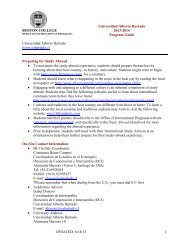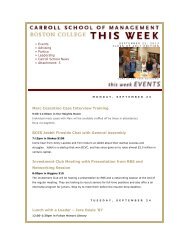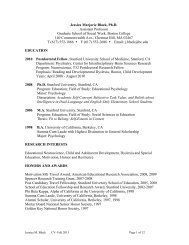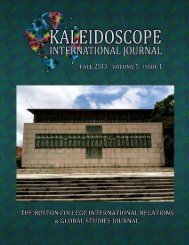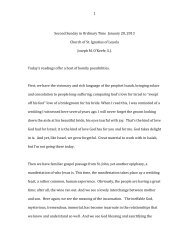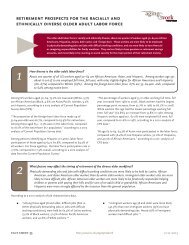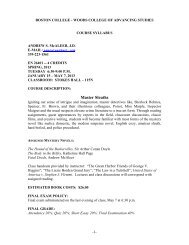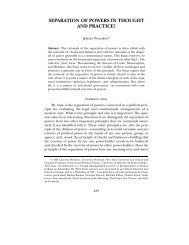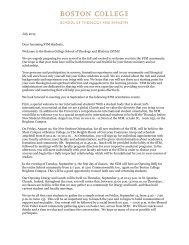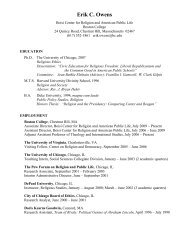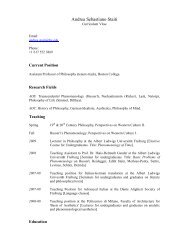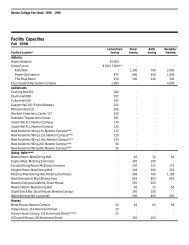Contemporary Social Theory - Boston College
Contemporary Social Theory - Boston College
Contemporary Social Theory - Boston College
Create successful ePaper yourself
Turn your PDF publications into a flip-book with our unique Google optimized e-Paper software.
2. Raymond Williams, Marxism and Literature. London: Oxford University Press, pp. 75-82, 95-<br />
100, 108-114, 122-135.*<br />
3. Steven Seidman, Chapter 8, “The Critical <strong>Theory</strong> of Jürgen Habermas, ” in Contested<br />
Knowledges, pp. 119-131.<br />
4. Patricia Ticineto Clough, “From Gynocentyrism to Standpoint Epistemologies,” in Feminist<br />
Thought, pp. 62-86.*<br />
5. Antonio Gramsci, “Intellectuals and Hegemony,” in Lemert, ed., <strong>Social</strong> <strong>Theory</strong>, pp. 263-265.<br />
6. Georg Lukacs, “The Irrational Chasm Between Subject and Object,” from History and Class<br />
Consciousness, in Lemert, ed., <strong>Social</strong> <strong>Theory</strong>, pp. 202-204.<br />
7. Arthur Kroker, “Baudrillard’s Marx,” in Arthur Kroker and David Cook, The Postmodern Scene.<br />
New York: St. Martins Press, 1987, pp. 170-188.*<br />
8. Antonio Gramsci, “Historicity of the Philosophy of Praxis, “The Hegemony of Western Culture,”<br />
and “Critical Notes on an Attempt at Popular Sociology,” in Selections from Prison Notebooks,<br />
trans. Quinton Hoare and Geoffrey Nowll Smith. London: Lawrence and Wishart, 1971, pp. 404-<br />
407; 416-430.*<br />
9. Immanuel Wallerstein, “The Modern World-System,” in Lemert, ed., <strong>Social</strong> <strong>Theory</strong>, pp. 390-397.<br />
10. Kenneth Allen, Chapter 10, “World System <strong>Theory</strong>: Immanuel Wallerstein,” in <strong>Contemporary</strong><br />
<strong>Social</strong> and Sociological <strong>Theory</strong>, Third Edition, pp. 224-245.<br />
11. Herbert Marcuse, “Repressive Desublimation,” in Lemert, ed., <strong>Social</strong> <strong>Theory</strong>, pp. 427-430.<br />
12. Robin D.G. Kelley, “Foreward” to Cedric J. Robinson, Black Marxism: The Making of the Black<br />
Radical Tradition. Chapel Hill: University of North carolina Press, 2000, pp. xi-xxxiii.*<br />
10. March 27<br />
<strong>Social</strong> Psychoanalysis: Ritual Structures and the Unconscious.<br />
Readings:<br />
1. Sigmund Freud, “The Psychical Apparatus and the <strong>Theory</strong> of Instincts,” “Dream-Work and<br />
Interpretation,” “Remembering, Repeating, and Working Through,” “The Return of the Repressed<br />
in <strong>Social</strong> Life, ” “Civilization and the Individual,” in Lemert, ed., <strong>Social</strong> <strong>Theory</strong>, pp. 129-133;<br />
133-137; 141-145; 145-149; 149-152.<br />
2. Jacques Lacan, “The Eccentric Self and the Discourse of the Other,” in Lemert, ed., <strong>Social</strong> <strong>Theory</strong>,<br />
pp. 342-344.<br />
3. Teresa Brennan, History After Lacan. New York: Routledge, 1993, pp. 1-25.*<br />
4. Paul Smith, “The Unconscious,” in Discerning the Subject.* Minneapolis: University of<br />
Minnesota Press, 1988, pp. 70-82.*<br />
5. Avery Gordon, “distractions,” in Ghostly Matters, pp. 31-60.<br />
6. Nancy Chodorow, “Gender Personality and the Reproduction of Mothering,” in Lemert, ed.,<br />
<strong>Social</strong> <strong>Theory</strong>, pp. 408-412.<br />
7. Jane Gallop, Reading Lacan, Ithaca: Cornell University Press, 1985, pp. 13-30.*<br />
8. Elizabeth Grosz, Jacques Lacan: A Feminist Introduction. Routledge, 1990, pp. 1-23.*<br />
9. Louis Althusser, “Ideology and Ideological State Apparatuses,” in Lemert, ed., <strong>Social</strong> <strong>Theory</strong>, pp.<br />
321-324.<br />
10. Slavoj Zizek, “Cynicism as a Form of Ideology,” in Lemert, ed., <strong>Social</strong> <strong>Theory</strong>, pp. 668-671.<br />
11. Anthony Elliot, Chapter 2, "Marcuse’s Freudian Revolution,” “Psychoanalysis and<br />
Postcolonialism,” and “Poststructuralist Anxiety: Subjects of Desire," in Psychoanalytic <strong>Theory</strong>:<br />
An Introduction, Second Edition, Durham, NC: Duke University Press, 2002, pp. 51-60; 99-124..*<br />
11. April 3<br />
Subjects of Power and Knowledge: Genealogy, History, Discourse.<br />
Readings:<br />
1. Michel Foucault, “Nietzsche, Genealogy, History” in Language, Counter-Memory, Practice,<br />
edited by Donald F. Bouchard. Ithaca: Cornell University Press, 1977.*<br />
2. Michel Foucault, “Power as Knowledge,” in Lemert, ed., <strong>Social</strong> <strong>Theory</strong>, pp. 473-479.



